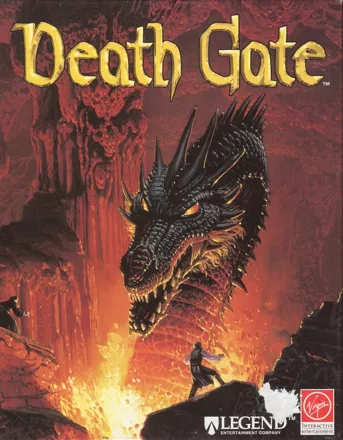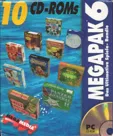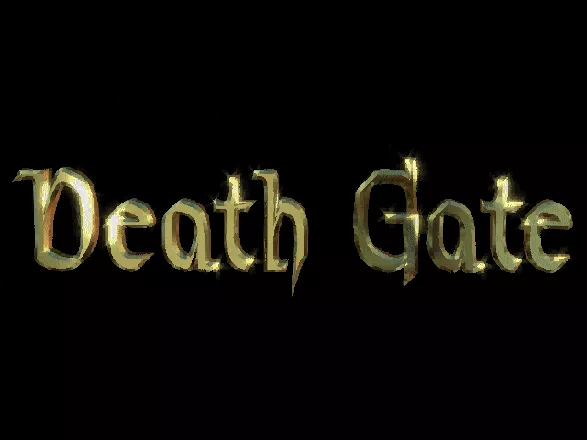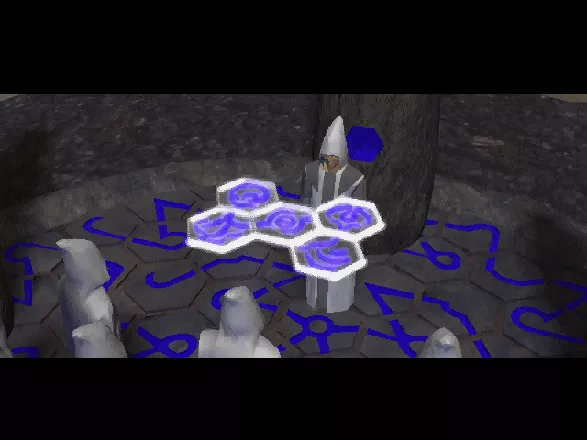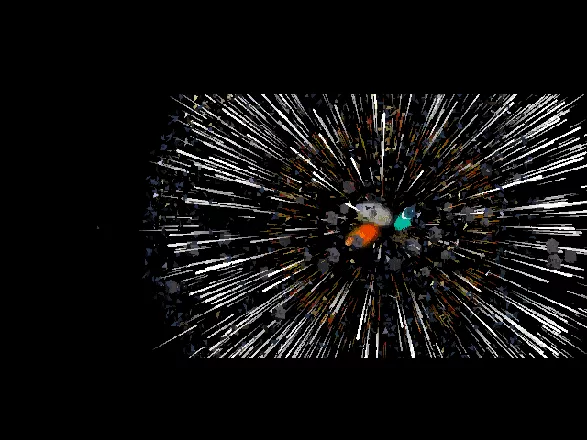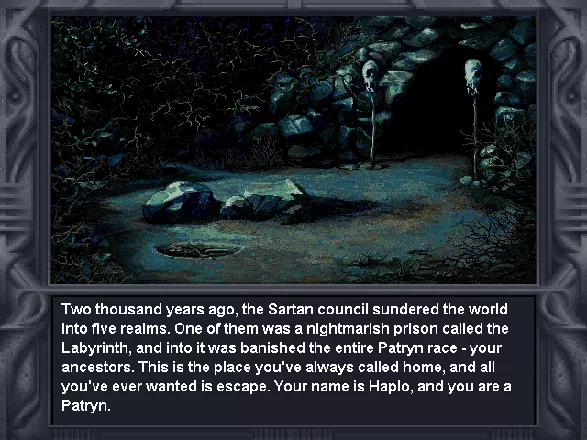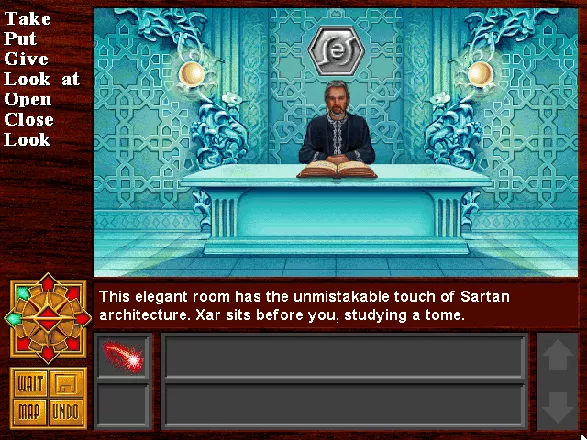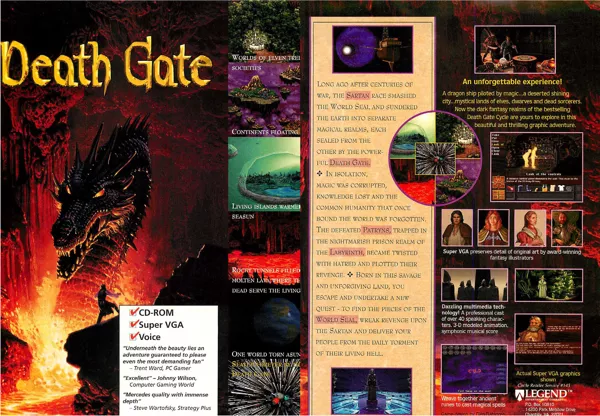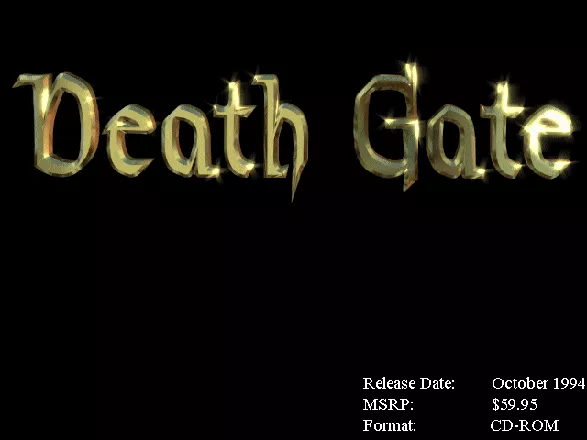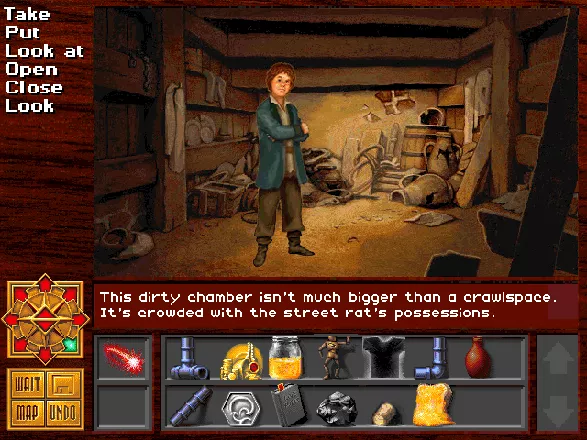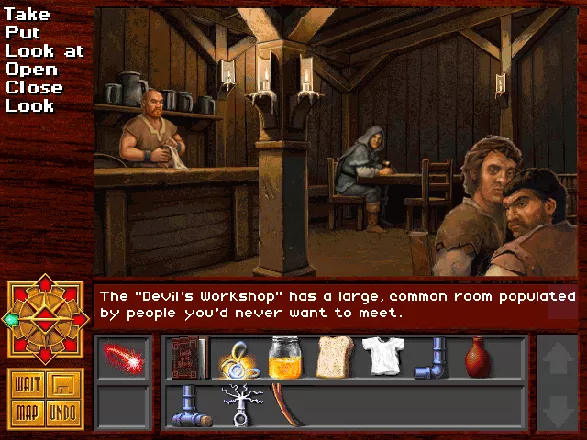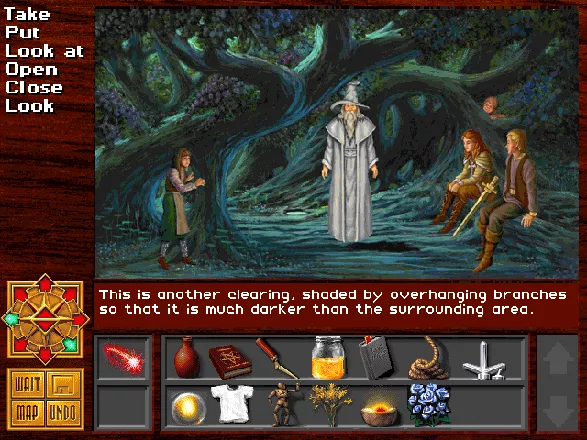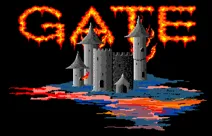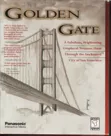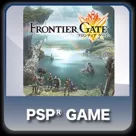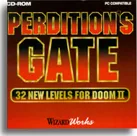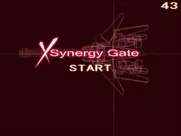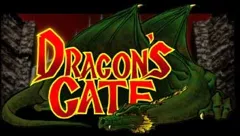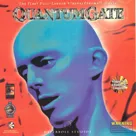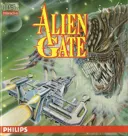Death Gate
Description official descriptions
Two thousand years ago, an advanced race known as Sartan split the world into five realms. The mensch races - the humans, dwarves, and elves - were split between four of those worlds named for the four elements, and the race of Patryn was banished to the deadly Labyrinth. After those two thousand years, some of the Patryn have found their way through the Labyrinth's exit. The game's protagonist is a young Patryn named Haplo, and his mission, given to him by his lord Xar, is to sail through the Death Gate into each of the other worlds to find each world's seal piece, so that the Patryn may reconstruct the planet and have revenge on the Sartan.
Death Gate is an adventure game that follows the tradition of interactive fiction with graphics. The entire game is viewed from first-person perspective and has plenty of text interaction through selectable verb commands, text descriptions, and dialogues with multiple choices. There are also many puzzles in the game, most of them inventory-based. A unique gameplay feature is Haplo's ability to cast magic spells, which are essential for solving many of the game's puzzles.
Groups +
Screenshots
Promos
Videos
Add Trailer or Gameplay Video +1 point
See any errors or missing info for this game?
You can submit a correction, contribute trivia, add to a game group, add a related site or alternate title.
Credits (DOS version)
57 People · View all
| Based on the novels by | |
| Design | |
| Programming | |
| System Design | |
| System Programming | |
| Graphics System | |
| Dialog System | |
| Music and Audio Direction | |
| Room Art | |
| Character Illustrations | |
| Alternate Interfaces | |
| 2-D Animation | |
| [ full credits ] | |
Reviews
Critics
Average score: 81% (based on 24 ratings)
Players
Average score: 4.2 out of 5 (based on 51 ratings with 7 reviews)
Interactive fiction at its peak
The Good
Death Gate appeared during a tumultuous epoch of game-making - the beginning of the so-called "multimedia revolution". It was also the last great era for the adventure genre. Sierra was wrapping up its famous comedy series and moving onto more mature experiments; Access Software created Under A Killing Moon; Myst conquered the masses and began to radically change the development of adventure games, for good or for (mostly) bad.
At that time, Legend had already firmly established its reputation as the leading developer of what could be considered the older sister genre of graphical adventures - interactive fiction with graphics. This sub-genre began its life as a logical descendant of text adventures. At first, some still pictures were added to the text. Then the old text input was replaced by a more user-friendly context-sensitive verb selection. This way interactive fiction became almost the same as graphical adventure; but true to the tradition, the graphics in those games were still restricted to pictures (sometimes sparsely animated) viewed from first-person perspective. And of course, text interaction was still the priority.
Text interaction is one of the strongest aspects of Death Gate. The game immerses you through the sheer wealth of interaction. Every action evokes a response from the game. You can easily lose yourself in this gameplay depth. I was amazed to see how many different responses they have written for different actions. Trying to do things was exciting; experimentation was rewarded and encouraged. Even if there were some generic messages, they were so well-written that you didn't notice they were generic. Many other adventure games of the time lazily rewarded your attempts with pitiful remarks such as "you can't do that". Well, in Death Gate, you certainly can do that. Trying different actions is so fun when you know that the game reacts to them. I don't even want to mention adventure games of later times with their lack of text and terrible "smart cursor".
Oh yes, there is plenty of text in Death Gate. That alone wouldn't count as a compliment - there is also a lot of text in Metal Gear Solid. But the text in Death Gate is good. It feels like salve on the wounds caused by the text of Japanese RPGs. From time to time you just need quality writing in games, and this one delivers. It's a pleasure to read the text descriptions. It's a pleasure to read (and hear, since they are well-voiced) the dialogues. There are emotions, there is rich vocabulary, there is humor. It's excellent writing, and it makes Death Gate similar to a book.
But it's not a book. It's an adventure game, and it shines as one. Death Gate has some of the best puzzles I've ever encountered in an adventure game, period. There is only one puzzle in the game that I found frustrating and unnecessary (rotating arrows) - but the game gives you hints for it, and even offers to solve it for you if you're stuck for too long. The rest of the puzzles follow crystal-clear logic, are given proper clues, require imagination to solve, and are perfect in difficulty. Some of the puzzles are simply brilliant and so imaginative, like for example manipulating an undead nanny who keeps reading the same children's rhyme and an undead worker who obeys every order.
One of the coolest features of Death Gate are magic spells, which you'll use to solve many of the game's puzzles. You'll usually learn those spells when somebody else uses them in front of you for his own reasons. Those spells are fascinating and guarantee a gameplay experience unlike any other adventure game around. Turning a portrait into reality, switching bodies with a dog, setting statues in motion - those are just a few examples of the interesting, creative magic of the game.
So far we have a great adventure game, but Death Gate also has something I value very much in games - it is set in a believable, rich, detailed world. In this way it reminded me of an RPG. The story comes with much background: there is plenty of historical, political, social information that you learn from dialogues with characters and from books you find in the game. I know that the world of Death Gate wasn't invented by the creators of the game (it was based on a series of novels I've never read), but the way it is shown in the game is impeccable, it's a joy to explore a world so interesting and so believable, in its own way.
The story has a certain shade of fairy tale, and is wonderful. Without any melodrama the game touches upon serious issues such as war and peace, tolerance and racism, freedom and control, and draws philosophical conclusions from them. But it never does it with annoying moralizing or overblown emotionality; it keeps the plot simple and puts all the depth into the dialogues and interaction with the characters.
The Bad
Not much. Can't say I loved the static first-person perspective. I'd certainly prefer real movement. The screens themselves are still, save for some sparse animations (like a bartender continuously wiping a glass). The graphics are good but not really "state of the art".
You can use a lot of magic spells in the game to solve its puzzles, but most of them need to be used only once or twice. Most of the time you'll have to use a spell shortly after you've learned it. The game conveniently puts you into rough spots in which the newly acquired spell is the only solution, but after the problem is eliminated, the spell in question will usually become neglected. I'd love to see more spell-based puzzles, with more creative use of those spells.
The Bottom Line
Death Gate is an exquisite game. You can fall in love with its wonderful story and its rich, detailed world, and its gameplay will intoxicate you if you like adventure games. It has marvelous interaction and some of the most delightful puzzles around. Undeniably one of the very best offerings of interactive fiction genre, Death Gate is to be savored, like a wine that only gets better with age.
DOS · by Unicorn Lynx (181780) · 2014
A surpisingly exceptional spin-off of the Death Gate Cycle books
The Good
*Though the story-line was greatly altered from the books (there being seven of them, they had little choice but to trunicate) the writers managed to preserve the basic plot and even gave the game some new interesting twists. I half expected the game story to seem choppy and inadaquate compared to the books, but I was presently surprised to see that it flowed quite nicely, even if gameplay seemed a bit short.
The game designers also came up with an extraordinary idea: spell creation. Instead of the typical 'find spell scroll - read spell scroll - know spell' play, in Death Gate you discover spell runes* through various means. The runes can then be placed into certain patterns that allow spells to be cast. Another great idea that never caught on.
The art work is quite nice by '94 standards, I recall being quite impressed the first time I played through. Though most scenes are static, there are a few cinematic cut-scenes through the game.
The Bad
The static scenery is kind of drab, though I think the exceptional art work helped keep it from being monotonous.
*Unfortunately, despite being great, spell casting was not developed as much as I would have liked to see it. Your character's entire spell repitoir is limited to just a few spell runes and patterns. It would have been nice if there were a wider range of combinations and more opportunities for spell creation.
Gameplay was a little short, but perhaps I only feel this way because I was a dedicated reader of the books.
The Bottom Line*
If you have read the Death Gate Cycle, I would greatly encourage you to try out the game. The story is much more simple, but fun nevertheless. The gameplay is very similiar to many Sierra games of the time, being static and puzzle based. I recommend this game to anyone else who enjoyes interesting games with intricate plots and puzzles.
DOS · by Gutter Snipe (21) · 2003
Very clever and immensely enjoyable, a must try!
The Good
Let's start with a small confession - this is a Legend fanatic here. I played all of their games, no stretch, and adore almost each and every one of them. They are true gems in the history of adventure games, the successors to Infocom, that were slightly overshadowed by Lucas Arts and Sierra in the early 90s.
At any rate, Death Gate is no exception in a legacy of great narratives implemented into even greater AGs.
Let's continue with yet another confession - I'm not an avid fan of the standard, run of the mill, dwarves/elves/dragons fantasy genre. By this I mean that I'm not very excited with such a setting, simply because in my mind it's been done way too many times. But every so often I'm pleasantly surprised when I find something, in any medium, that rises above the banal.
And Death Gate is exactly such an example.
True to its place in the category of fantasy, the game is epic. It involves events of cosmic proportion; race wars and conflicts, racial superiority, evil, clandestine guilds and societies. It also features the obligatory comic reliefs, the chance companions, the casual love story and of course - a copious amount of magic and deceit. All of this is presented in lush, colourful artwork, depicting detailed and varied locations and crisp environments. There's a myriad of characters to talk to and interact with in different ways and attitudes, all rendered in large, richly detailed portraits, all voiced expertly. You get to experience first-hand a literally sundered world, as you voyage through the different lands and realms. In each of these you will encounter various denizens and monsters, and learn more and more of your quest. Huge sources of info are also books scattered throughout the game. One thing can be said for sure - nothing is as it seems, and there are many shades of black and white here. So be prepared for lots of twists and turns.
Despite all this, the story isn't the game's strongest point. That would be the puzzles. You see, in DG you have two kinds of puzzles: One, the good old inventory puzzles. The other is puzzles which are solved utilising the magic/rune system. There's a very piquant explanation to how magic works in the game's universe, relying on the possibility that everything is possible, and so the magic-user bends reality in this fashion in order to cast magic, to put it succinctly. Spells are obtained by watching others performing them, a very straightforward and comfortable approach. This is an AG remember, so no leveling up nonsense (no offence to RPG players :P). Of course, there's actually a third kind of puzzle - the combination of the first two types.The spells have very specific definitions to them, which you must follow in order to succeed. This makes it very interesting - you run into different situations and obstacles you must solve through careful engineering of a magic strategy. There's lots of good ol' fantastical logic here, and each and every puzzle relates to a specific situations in the game. So no random sliders appearing out of thin air. Gameplay is done via a simple PNP interface, with verbs used to construct sentences with hotspots on the screen. Many of these verbs are contextual.
As a final note, DG is free of any redundant combat sessions (which plagued the otherwise wonderful Shannara) - it's pure adventure, no hybrid symptoms.
The Bad
As much as I love rich dialogues and texts, the case here is a bit extreme - Death Gate is simply too verbose. Yes, it's interesting, yes it's engaging, yes it's done well - but it's too much nonetheless. If you're going to try it, expect volumes of reading material and hopelessly loquacious characters.
While the backdrops are indeed good looking, they felt a bit too static at times.
The music, while adequate and mostly fitting, is a bit repetitive at times.
The Bottom Line
All in all, an outstanding result of a great endeavour. Death Gate certainly ranks high amongst those Legend classics, a place it most undoubtedly deserves.
DOS · by Tal Cohen (31) · 2008
Trivia
Extras
Packaged with the game was an exclusive short story set in the Death Gate universe, by Margaret Weis and Tracy Hickman.
Graphics
The game includes two sets of artwork: a high resolution 640x480 SVGA version, and a low resolution 320x200 MCGA version. The graphics of the latter are not automatically scaled down from the SVGA version; they were manually redrawn to take advantage of the lower resolution.
Inspiration
Based on The Death Gate Cycle, a series of novels by Margaret Weis and Tracy Hickman.
Voice acting
Lead designer Glen Dahlgren provided the voice of Sang-Drax.
Information also contributed by Kamnari and Ye Old Infocomme Shoppe
Analytics
Upgrade to MobyPro to view research rankings!
Identifiers +
Contribute
Are you familiar with this game? Help document and preserve this entry in video game history! If your contribution is approved, you will earn points and be credited as a contributor.
Contributors to this Entry
Game added by Eurythmic.
Windows, Macintosh, Linux added by Cavalary.
Additional contributors: Patrick Bregger.
Game added July 21, 1999. Last modified February 20, 2024.
